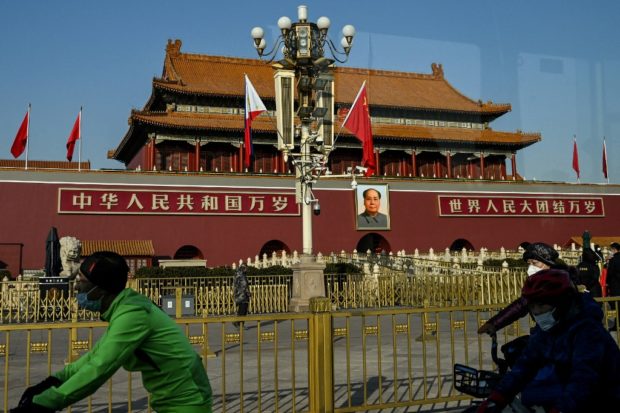Manila, Beijing to ink 14 pacts

The national flags of the Philippines and China are seen together near the Tiananmen Gate as Philippine President Ferdinand Marcos Jr visits, in Beijing on January 3, 2023. (Photo by Noel CELIS / AFP)
Manila and Beijing are expected to sign more than a dozen agreements during President Marcos’ three-day visit to China, including one to bring in Philippine durian into the Chinese market and another intended to prevent the escalation of conflict in the West Philippine Sea.
Department of Foreign Affairs (DFA) spokesperson Tessie Daza said on Tuesday that the signing ceremony for the agreements is set on Wednesday.
Mr. Marcos was joined by a high-level delegation to the Chinese capital when he left on Tuesday afternoon.
Besides pursuing economic and trade deals, he is expected to take up political and security issues in the region with his Chinese counterpart, Xi Jinping. (See related story on this page.)
‘Miscalculations’
Foreign Secretary Enrique Manalo will sign the Memorandum of Understanding (MOU) on Communication Mechanism on Maritime Issues with Chinese Foreign Minister Wang Yi.
Article continues after this advertisementAccording to Assistant Foreign Secretary Neil Imperial, the MOU will provide for “direct communication” between the foreign ministries of the two countries at “various levels” to prevent “miscalculations and miscommunications” on the West Philippine Sea.
Article continues after this advertisementRelations between the Philippines and China have been strained by the latter’s activities in the West Philippine Sea, or waters within the Philippines’ exclusive economic zone in the South China Sea, which is claimed by China.
The MOU on the maritime hotline between Manila and Beijing is one of 14 agreements expected to be formalized during Mr. Marcos’ first visit to China.
Durian deal
The other MOUs deal with communications technology, tourism, renewable energy and people-to-people exchanges, as well as financial grants from China.
Imperial said one of the MOUs would involve the importation of durian to China, as the Chinese market has a “voracious appetite” for the fruit, he said.
China is the biggest importer of durian. In 2021, it imported 822,000 tons of the fruit worth $4.21 billion, about 82.4 percent higher than the previous year’s volume, according to Chinese Ambassador to Manila Huang Xilian.
Imperial said the two governments are exploring other economic opportunities, such as potential Chinese investment in durian farms in Mindanao and nickel processing.
China, according to Imperial, imports 70 percent of its nickel ore and concentrate materials from the country.
Manalo will also be signing an MOU on Belt and Road Initiatives with his Chinese counterpart, and, on behalf of the Department of Agriculture, the Joint Action Plan on Agriculture and Fisheries Cooperation. INQ